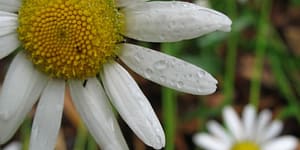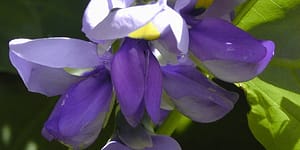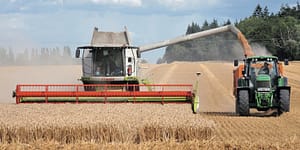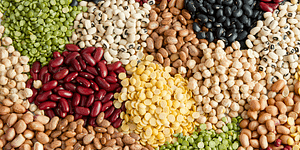Earth Day Reading: 13 Essential Books

This year, people all around the world are celebrating a milestone—the 50th anniversary of this international day of action for our environment. Why not celebrate Earth Day by reading about our great planet? We’ve compiled 13 books to get you started!

He challenges us to examine our broken relationship with the world, to think boldly, wildly, and in new ways about ourselves—as individuals and as a collective.
Featured Excerpt:
|
|
|---|

But that day was also the start of a journey, one filled with silver birches and hairy-footed flower bees, skylarks, and rosebay willow herb, and the joy that comes with deepening one’s relationship with place.
Dancing with Bees is Strawbridge Howard’s charming and eloquent account of a return to noticing, to rediscovering a perspective on the world that had somehow been lost to her for decades and to reconnecting with the natural world.
Featured Excerpts:
|
|
|---|

The consequences of losing beavers were profound: streams eroded, wetlands dried up, and species from salmon to swans lost vital habitat. Today, a growing coalition of “Beaver Believers”—including scientists, ranchers, and passionate citizens—recognizes that ecosystems with beavers are far healthier, for humans and non-humans alike, than those without them.
Featured Excerpts:
How Beavers Can Save the World from Environmental Ruin
|
|
|---|

His mission: to give voice to those emerging from one of the most painful periods of economic and social turmoil in Ireland’s history. Engaging, provocative and sincere, Hitching for Hope is a testimony to the spirit of Ireland. It is an inspirational manifesto for hope and healing in troubled times.
Featured Excerpts:
|
|
|---|

There’s a rise in extremist movements and governments. Catastrophic climate change. Biodiversity loss. Food insecurity. The fracturing of ecosystems and communities beyond, it seems, repair. The future—to say nothing of the present—looks grim.
From What Is to What If is a call to action to reclaim and unleash our collective imagination, told through the stories of individuals and communities around the world who are doing it now, as we speak, and witnessing often rapid and dramatic change for the better.
Featured Excerpts:
What if We Started Asking Better Questions
|
|
|---|

In synergy with the Sunrise Movement and the growing support of a Green New Deal, Grassroots Rising will impact millions of conscious consumers, farmers, and the general public during the crucial 2020 election year and beyond. This book shows that a properly organized and executed Regeneration Revolution can indeed offer realistic climate solutions while also meeting our everyday needs.
Featured Excerpts:
Rules for Regenerators: Search Out and Emphasize the Positive
Road to Regeneration: Starting point
|
|
|---|

Through stories and maps, she reveals how feverish competition among superpower intelligence networks, military, and Big Oil interests have fueled indiscriminate attacks and targeted killings that continue to this day—from Jamal Khashoggi’s murder to drone strikes.
The book delivers an irrefutable indictment of these devastating forces and how the brutal violence they incite has shaped the Middle East and birthed an era of endless wars.
Featured Article: On Birth and Survival: Publishing in the Time of a Pandemic
Featured Excerpt: Chapter One – Tracking Tapline
|
|
|---|

We have to regrow the soil and turn back the desert. We have to save whales, wombats, and wolves. We have to reverse the flow of greenhouse gases and send them in exactly the opposite direction: down, not up. We have to flip the carbon cycle and run it backwards.
Featured Excerpts:
The Evolution of Earth, Humans, and Our Natural Resources
CARBON CASCADES: How to Restore Earth’s Natural Balance
|
|
|---|

Featured Excerpt:
Our Complicated History with Oil, Power, and War
Our History: A Look at Oil, Power, and War
|
|
|---|

The book gives people the tools to understand not only why mass disruption, mass arrests, and mass sacrifice are necessary but also details how to carry out acts of civil disobedience effectively, respectfully and nonviolently.
Featured Excerpt:
When Common Sense Equals Mass Rebellion
|
|
|---|
Trees are our allies in healing the world. Partnering with trees allows us to build soil, enhance biodiversity, increase wildlife populations, grow food and medicine, and pull carbon out of the atmosphere, sequestering it in the soil.
Trees of Power explains how we can work with these arboreal allies, specifically focusing on propagation, planting, and individual species. Author Akiva Silver is an enthusiastic tree grower with years of experience running his own commercial nursery. In this book he clearly explains the most important concepts necessary for success with perennial woody plants.
Featured Excerpt:
Learning from Our Arboreal Allies
|
|
|---|

In this lively and joyous book, Shanahan recounts the epic journeys of tiny fig wasps, whose eighty-million-year-old relationship with fig trees has helped them sustain more species of birds and mammals than any other trees; the curious habits of fig-dependent rhinoceros hornbills; figs’ connection to Krishna and Buddha, Jesus and Muhammad; and even their importance to Kenya’s struggle for independence.
Featured Excerpt:
Snakes and Ladders & Tantalising Figs
|
|
|---|

Featured Excerpts:
A Grassroots Revolution for Pesticide-Free Communities
Recent Articles
Oxeye daisies are one of the most important plants for pollinators including beetles, ants, and moths that use oxeye daisies as a source of pollen and nectar. Instead of thinking about removing a plant like oxeye daisy, consider how you can improve the fertility and diversity of habitat resources in your home landscape, garden, or…
Read MoreThis long-lived perennial legume is used for forage and erosion control. Kudzu is edible with many medicinal uses and other applications. Pollinators of all kinds love its prodigious lavender blooms!
Read MoreMove aside, maple! We have two new syrups to add to the table. Read on for insights on tapping, selling, and eating syrup from walnut & birch trees.
Read MoreWhy is modern wheat making us sick? That’s the question posed by author Eli Rogosa in Restoring Heritage Grains. Wheat is the most widely grown crop on our planet, yet industrial breeders have transformed this ancient staff of life into a commodity of yield and profit—witness the increase in gluten intolerance and ‘wheat belly’. Modern…
Read MoreDid you ever wonder how leeks, kale, asparagus, beans, squash, and corn have ended up on our plates? Well, so did Adam Alexander, otherwise known as The Seed Detective. The following is an excerpt from the The Seed Detective by Adam Alexander. It has been adapted for the web. My Seed-Detective Mission Crammed into two…
Read More








